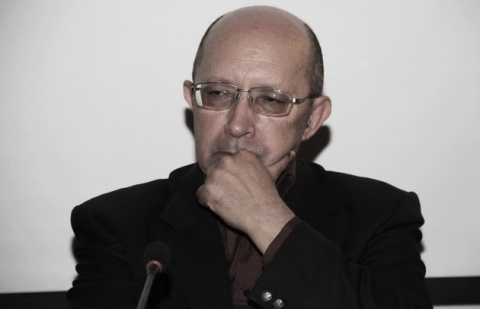Interview with longlisted author Mohammed Harradi
21/02/2023

When did you begin writing The Melody of the Rabbit and where did the inspiration for it come from?
I wrote The Melody of the Rabbit in about two years, intermittently, but the bibliographic research, investigation on the ground and consulting the archive took about eight consecutive years, until the Summer of 2022. I had been thinking about the idea for the novel for many years, more than half a century.
Since the 1970s, I have been interested in the situation of the White Russians who emigrated to Morocco and made it their place of enforced exile after the war and the Bolshevik Revolution. During the years of the French protectorate, their society was more or less a closed one. I was especially interested in the life of the Countess Pauline De Mazières, who ran “l’atelier”, a hall in the capital, Rabat, where Moroccan art was displayed, as well as the engineering works of her husband. I also reflected on the work of the administration of Marshall Lyautey in the first years of the French protectorate in Morocco, looking at the details of his building policy. I made use of the French archive specialising in land usage, town planning and building styles common at the time. All this led to the idea of the novel crystallising in its initial form, before the field of research widened to include other subjects.
Did the novel take long to write and where were you when you finished it?
In order to devote myself to work, research and writing, I rented a place to stay in a peaceful village on the Atlantic coast, about two hours away from the capital, called Moulay Bousselham. It only becomes full of holidaymakers in the summer months, while during the rest of the year it is practically empty. For eight years when I lived there, I wrote and researched full time, as well as doing freelance journalistic work which covered most of the costs of being a full-time writer.
Do you have writing rituals?
In my retreat by the sea, while writing The Melody of the Rabbit, and even at times of not doing anything and relaxing, I usually felt like listening to music by Bach, so that I could contemplate the structure of its rhythm and arrangement of the notes. This helped me a great deal as a writer, along with sonatas and texts by Russian musicians who are mentioned in the book. Sometimes I listen to the singing of Fairuz, to be transported by its delicacy. That is usually in the early morning before anything else had happened. Or I might enjoy silence before plunging down into its deep well. Silence too has a value sometimes greater than any voice. Although I don’t know Italian, occasionally I loved listening to the old songs of Caruso. His voice and music create an “atmosphere” for me and a feeling of delicious sadness. But usually, I would surrender to the ever-raucous voice of my neighbour, the sea. I felt as though he was knocking at the doors, wanting entrance. Or I would listen on sunny mornings to the creatures of the nearby wood covering the horizon on the other side, at that early time of the day when I was isolated from the world, all alone, and the silence – or the other exterior voices – brought me back to my true self. Silence first of all, then beautiful voices which gave me a rare sensation of inner satisfaction and fullness. When that happened, I got up and sat in front of the computer to work and write, from the heart, until the middle of the day.
I dislike frustrating days, which happen frequently, when I am lazy and sit around doing nothing meaningful, staring into empty space. I feel then that I am a creature from the works of Samuel Beckett.
What is your next literary project after this novel?
For me, projects for novels don’t come to my mind independently from each other. They constantly multiply, one generating another. They are always fluid, developing and changing, part of the pattern of everyday life and interests.
For several years, I have had a desire to write a film screenplay about strange events occurring in a forgotten mountain village. Now, that old aspiration has turned into a project for a novel, which will require time for research and editing in order to be completed like those before it. I have overcome the difficulties of the beginning and have a clear plan for it. The early experimental pages are encouraging. This is very important. But as I get older, time has become a big challenge too.
